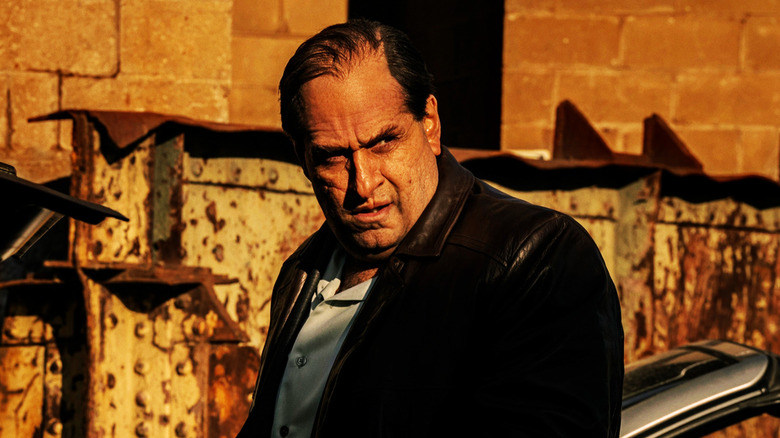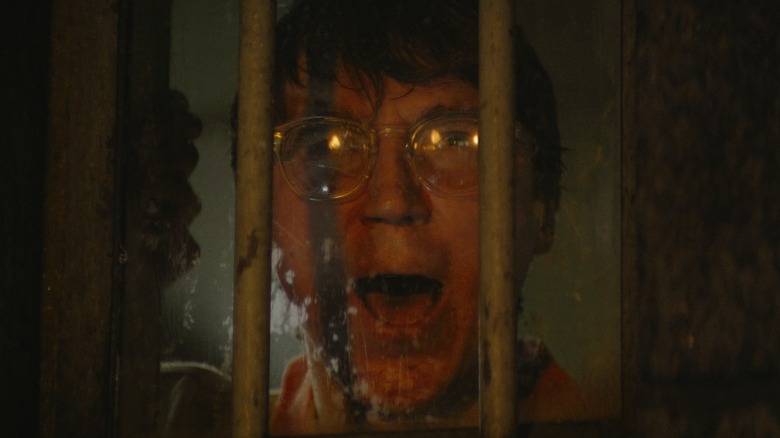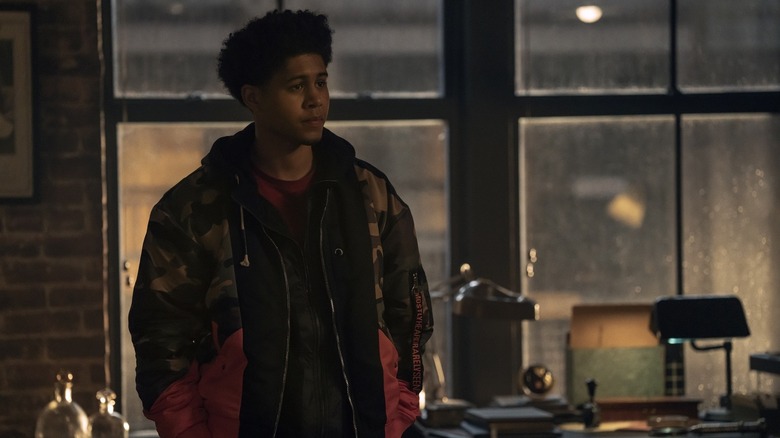The Penguin Just Showed The Real Human Cost Of Riddler's Plan From The Batman
This article contains spoilers for "The Penguin."
As MAX's "The Penguin" series goes on, showrunner Lauren LeFranc has increasingly proven her commitment to making a full-on crime drama free of any superhero shenanigans. The show is a dark and violent look at Gotham's underbelly that takes its cues from classic crime stories of the past. But "The Penguin" isn't just a "Sopranos" pastiche with a few "The Godfather" allusions sprinkled in. This series also has things to say about the worship of antiheroes and provides an in-depth look at the real-world consequences of inequality.
"The Penguin" begins in the immediate aftermath of the events in 2022's "The Batman." In the film, Edward Nashton/The Riddler (Paul Dano) blew up Gotham's seawall. This was his attempt to call attention to corruption in Gotham and how The Renewal Fund, designed to support projects such as the seawall, had been pilfered by organized crime groups with the help of city officials. In the ensuring chaos, Riddler and his online followers planned to assassinate mayor elect Bella Reál, but were thwarted by Robert Pattinson's Dark Knight. When "The Penguin" begins, huge swathes of Gotham are underwater as a result of Riddler's scheme, and we see the titular rogue breaking into the late Carmine Falcone's hideout, leaving wet footprints on the floor as a result of having to trudge through the floods to get there.
As the first and second episode unfurl, the show takes great pains to show the havoc caused by Riddler's plan. This is not the typical urban decay you might associate with Gotham City. Subway trains lay derailed in stations, entire neighborhoods lie submerged, and FEMA camps have been set up around the city to support the dispossessed. But it's not until episode 3, "Bliss," that we gain a real insight into how misguided and wicked Riddler's plan was, and how tragic its consequences really are — thereby retrospectively bringing more gravity and realism to what was otherwise a somewhat abstract and nonsensical plot from "The Batman."
Episode 3 of The Penguin is all about Victor and the Riddler
In episode 2 of "The Penguin," we saw the titular rogue's new apprentice, Victor Aguilar (Rhenzy Feliz), briefly stop and stare at some missing posters nailed to a wall. These were the faces of the people lost in the wake of Riddler's plot, and Victor lingering on them hinted at some sort of connection. Was one of the people on the posters a relative? Later in the episode, at one point Victor gets a text from someone named Graciela, asking if he's okay. Beyond that, however, not much is revealed about the character's past.
Episode 3 changes all that, right from the outset. The pre-title sequence is a flashback that shows Victor at his parents' apartment where he gets a text from Graciela, who it turns out is his girlfriend. The show then cuts to Victor and Graciela hanging out on a Crown Point rooftop awaiting a fireworks display. From their hangout spot, Victor can see his family's apartment in a block on the opposite side of the street. As the couple converse, explosions start to rock the city and we realize we're witnessing Riddler's seawall explosions from a different angle. The water starts to flood into Gotham as Victor desperately tries to call his mom, but he can only watch in horror as the water surges towards his home, blasting into the building's facade, through a Bella Reàl poster on his parents' fire escape, and straight into their apartment.
This is why Victor stopped to stare at the posters of missing people in episode 2. His own family were wiped out and his neighborhood destroyed by Riddler's leveling of the seawall, and he was presumably driven to the kind of petty crime that led to him boosting Penguin's rims — a clever spin on Robin's origin story from the comics. But this is about more than fleshing out Victor's backstory. The fact that Victor, who hails from a low-income neighborhood, was so directly affected by Riddler's plan shows how misguided that plan was from the outset. Far from impacting the corrupt elites who allowed Gotham to become a cesspool, Riddler's plan hit the disadvantaged hardest, with Victor and Crown Point standing as physical proof of that unpleasant fact.
The Penguin is much more than a superhero spinoff
There's a reason "The Penguin" listens to Dolly Parton. Specifically, the country singer grew up in a one-bedroom cabin with 11 siblings before becoming one of the most successful country stars of all time. What is Oz Cobb if not the gangster equivalent of early-career Parton? An ordinary kid from the neighborhood who harbors ambitions to not only make it big, but to also become the most influential figure in his chosen business — only instead of country music, it's organized crime.
In many ways "The Penguin" is doing something "The Batman" simply couldn't. That is to say that with eight episodes, the MAX series is really able to delve into the themes that motivated Matt Reeves' film — corruption, inequality, crime — and explore them in a way that actually speaks to some real-world truths, both social and political. The fact that Victor and his neighborhood were so badly hit by Riddler's misguided plot means that Victor is vulnerable. That makes him the perfect target for someone like Ozwald Cobb — a master manipulator who can talk his way out of, or into, anything and is intent upon winning at any cost. It's not just that episode 3 of "The Penguin" gives us a more detailed view of the events in "The Batman," then. It's that it gives us a much more detailed view of Gotham and its issues with inequality and an intimate look at how people like Oz Cobb can succeed in such circumstances, thereby heightening the show's sense of realism and its connection to similar real-world issues.
Episode 3 establishes "The Penguin" as not only a worthwhile endeavor to flesh out Matt Reeves' Gotham, but as much more than a "Sopranos" pastiche. The show is concerned with real-world problems, and is daring you to side with its charming protagonist, just as Victor does by the end of the third episode. With this installment, we see how such a mistake is borne of an ill-conceived plan that decimated low-income neighborhoods, making the events of "The Penguin" a true continuation of the events in "The Batman," an analog for contemporary issues, and establishing this show as much more than a superhero spinoff.
New episodes of "The Penguin" premiere Sundays on HBO and MAX.


